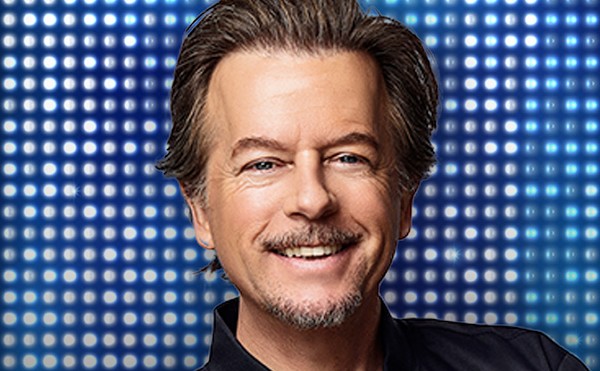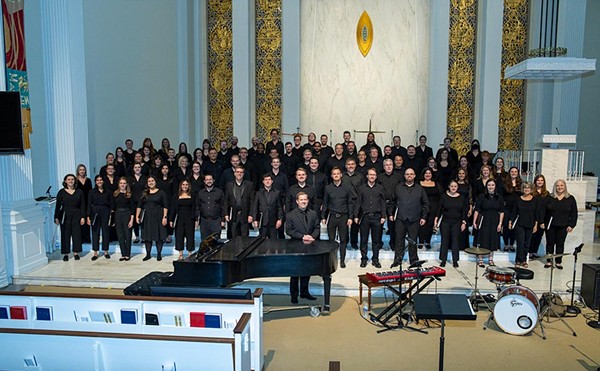When "American Movie" won the Grand Jury Prize in the Documentary category of last year's Sundance Film Festival, it was a clear victory for director Chris Smith. On only his second trip to Park City, Utah, he had truly brought home the indie bacon.
But the award was a far bigger triumph for another filmmaker: Mark Borchardt, the hilariously outspoken auteur who is the documentary's consistently fascinating central character. As seen in the film, Borchardt's struggle to complete his own low-budget short -- a quest that's hampered by a perpetual shortage of funds, capable crew members and reliable props -- is specific enough to have tickled the audience of industry insiders, yet still speaks volumes to the rest of us about the nature of ambition and desire.
Borchardt was never destined to make it to Sundance on his own. A high-school dropout who lives and works not in Hollywood but the oppressively grim Menomonee Falls, Wis., he's an avowed fan of horror maestro George Romero who lists "Dawn of the Dead" and "Jesus Christ Superstar" among his all-time favorite films. He's also bedeviled by a recurring battle with alcohol: As he admits in one of "American Movie's" most side-splitting interviews, getting bombed on peppermint schnapps and placing long-distance calls at 2 a.m. to hotels in Morocco is not a great way to stay on budget.
Such priceless moments as these make one wonder if Smith is as talented as he is lucky.
Borchardt's dream is to complete "Northwestern," a black-and-white, 16 mm drama he's tinkered with since 1984. To do so, he must obtain $45,000, a sum he elects to raise by lensing another film -- the 35-minute shocker "Coven" -- and selling 3,000 VHS copies of it to horror buffs as a direct-mail cash cow. But the combination of his limited resources and bad habits forces the production schedule for "Coven" (pronounced "KOH-ven," he stresses, so as not to sound too much like "oven" ) to drag on for a full two years.
"This was supposed to be the quick little film we did between our other movies," Smith remembers. By "we," he refers to his alliance with partner/producer/sound recorder Sarah Price, who was his collaborator throughout the protracted process. "[But] it just kept going on and on. We shot for two years and edited for another two years."
Who, after all, could walk away from Borchardt? Smith knew he had struck gold, he says, the minute he met Borchardt at the University of Wisconsin, where Smith was doing postproduction work on his first film, "American Job," and Borchardt was shooting scenes for "Coven." Captivated by "this guy who [was] putting everything out there," Smith and Price essentially moved in with Borchardt for 24 months, becoming such fixtures in his life that their film's objectivity is nearly impossible to assess.
Smith freely refers to Borchardt and his Wisconsin buddies as his "friends," not his subjects; still, the portrait "American Movie" paints of Borchardt is often less than flattering. In several scenes, the wannabe director is seen spending quality time with the children he fathered by a former girlfriend, but when he recites his mounting financial troubles, his litany of credit-card bills and expenses includes a lightning-quick reference to an unpaid child-support balance of $3,000 -- exactly the amount he's simultaneously seeking to finance "Coven."
Speaking by phone from his Wisconsin home, Borchardt nonetheless expresses delight with the finished product. "I learned through that film that nobody's perfect," he relates. "I don't feel exposed or nothing like that."
And as a fellow director, he says, he was determined to preserve Smith's artistic freedom: "No way would I taint or pollute his vision," Borchardt declaims.
Smith has a second explanation. "We were shooting 12-, 16-hour days," he recaps, "so I don't think he was thinking, 'Oh they caught something bad.' [And] I don't really think he cared that much about what we were capturing on film. He was working on his project and that's the world that he was in."
Borchardt was also busy entertaining fantasies of upward mobility. The reaching for success is a leitmotif of "American Movie," with Borchardt's celluloid endeavors the wished-for salvation from a dark future. The two straight jobs he's seen performing are delivering the Wall Street Journal and vacuuming the carpet of a local mausoleum; in his spare time, he drives into an affluent neighborhood to eyeball the houses he one day hopes to inhabit. "I will be goddamned if I don't get the American dream," he vows.
In retrospect, Borchardt backs away a bit from the avaricious aspects of his story. "When you talk about money and women, that's for entertainment purposes," he downplays. "If I speak seriously, it's not entertainment anymore. I don't give a damn about money, but I give a damn about life, and it's just going by too damn quick."
If that sounds like a bit of a flim-flam, it's wholly in keeping with American Movie, which presents its hero as a well-meaning soul who's nonetheless not above conning himself or others as the need arises. Nowhere is the contradiction more apparent than in his complex relationship with his aged Uncle Bill. A decrepit octogenarian who pines for his dead wife, Bill retains faith in absolutely nothing, least of all the film project his nephew begs him to help finance with a $3,000 loan (that number again). Being part of the project, Borchardt enthuses, will bring belated meaning to the old man's life. How much of his enthusiasm stems from genuine concern and how much is simple conniving is left to us to decide.
There's nothing devious about Mike Schank, the guitar-playing buddy and ever-ready personal assistant whose place in Borchardt's life is diametrically opposed to Uncle Bill's. A curly-haired, soft-spoken acid casualty, Schank exhibits a confused-but-easygoing demeanor that's utterly -- if guiltily -- hilarious. Beneath his hapless exterior, however, beats a championship heart: His support of Borchardt's dream is remarkable in its selflessness.
The concept of family, both real and extended, informs American Movie, and there's something distinctly Midwestern about the genuine affection Borchardt and Schank demonstrate as they toil away together. It's too bad, then, that the movie's posters and other promotional materials reduce them to a Wayne-and-Garth team of party-hound compadres, giving no hint of their human frailties (not to mention treading onto questionable moral ground by presenting a hard-core drinker and his overdose-survivor pal as simple figures of fun).
Dumbed-down is as dumbed-down does, so it's only a mild shock to learn that nameless, clueless folks have been e-mailing Borchardt since the movie was released, offering to "party" with the admitted alcoholic.
"I'm not going to go out seven nights a week with individuals I don't know and drink and repeat myself," he scoffs. "That's just not going to happen." Instead, he's concentrating on selling his remaining copies of "Coven" (he recently passed the halfway mark), then tackling "Northwestern" in earnest.
"It's about this guy drinking in a junkyard," Borchardt explains. "He has a white freak girlfriend who argues all the time. He has to write himself out of this lifestyle. He's an alcoholic and he's working on this book. It's not about slackers or Generation X. It's not about that crap."
And no matter how much notoriety "American Movie" brings him, he swears that selling out to a major studio is not in the cards.
"They'd take "Northwestern" and make a mockery out of it," Borchardt fears. "As Mark Twain said, or whoever the hell said it, the twain just ain't gonna meet. I'll just make it for 70 grand and make it the way I wanna make it. Your girlfriend ain't gonna be in it. It ain't gonna be in color."
His motivated optimism sets him apart from Smith's previous oeuvre: "American Job" (1995) was a bleak, slow-moving fictional comedy in which an underskilled Midwestern loser drifted from one dead-end position to another, with only the prospect of winning the lottery to give his days hope. Borchardt aspires to better, and though his vacillation between the bottle and the camera (a bipolarity Smith attributes to an "all or nothing" personality) is consistently troubling, the film remains clearly on Borchardt's side. The unsentimental lens "American Movie" trains on the rest of Borchardt's Wiscon-sin milieu turns misty whenever the desperate maverick's eyes glaze over at the prospect of making his dream a reality.
Ironically, his biography's most overt philosophy is a reinforcement of that hoary moral standby, the Protestant work ethic. "I'm totally straight right now," Borchardt boasts. "I've got work to do, and when I've got work to do, I'm on top of the world."
The 9:30 p.m. Friday and Saturday, Feb. 18 and 19, showings of "American Movie" at Enzian Theater will be followed by late screenings of Coven.

















